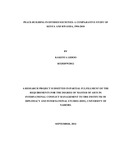Peace-building in divided societies: a comparative study of kenya and rwanda, 1994-2010
| dc.contributor.author | Leboo, Kakenya | |
| dc.date.accessioned | 2014-11-25T06:57:04Z | |
| dc.date.available | 2014-11-25T06:57:04Z | |
| dc.date.issued | 2014-09 | |
| dc.identifier.uri | http://hdl.handle.net/11295/75238 | |
| dc.description.abstract | There is a growing acknowledgement that ending the world‘s violent conflicts and wars and creating peace cannot only be achieved by Track I diplomatic efforts. New governments of the war-torn societies face the challenges of rebuilding the state while at the same time they need to address the causes of the civil conflict in such a way that will preclude a future return to violence. Rwanda and Kenya offers a typical example of a society torn apart by ethnic violent conflict. The genocide of 1994 and 2007/2008 postelection violence in Kenya destroyed relationships between Rwandans and Kenyans along ethnic line respectively, who yet continue to live next to each other. In this regard efforts to restore the relationships of country men and women becomes worthwhile to undertake for a progressive country. It is against this background that this study sought to conduct a comparative analysis of Kenya and Rwanda to assess the effectiveness of efforts in both countries to restore sustainable peace. The overall objective of the study was to assess peace-building in divided societies. The study was a comparative analysis of Kenya and Rwanda. The study was guided by the following hypotheses: Justice and reconciliation enhances peace-building in divided societies and that civil society engagement is effective in peace-building in divided societies. This study was based on Burton‘s human needs theory of conflict resolution which operates on the premise that a pre-condition for the resolution of conflict is that fundamental human needs be met and Lederach‘s theories on conflict transformation which explains the differences between social justice activists and conflict resolution practitioners along with a tension that often exists between the two. The study found that that justice and reconciliation remains key to securing a peaceful future in Kenya and Rwanda and in preventing the use of past injustices as the seed for renewed conflict. It is also established that acknowledgment is a key pillar of reconciliation. It also revealed that civil society has the ability to contribute to peacebuilding and facilitate the conditions necessary for building a sustainable peace. The study recommended that the government fully implement the TJRC report recommendations as well as other unimplemented recommendations from commissions of inquiry relating to reconciliation among others. | en_US |
| dc.language.iso | en | en_US |
| dc.publisher | University of Nairobi | en_US |
| dc.title | Peace-building in divided societies: a comparative study of kenya and rwanda, 1994-2010 | en_US |
| dc.type | Thesis | en_US |
| dc.type.material | en_US | en_US |

